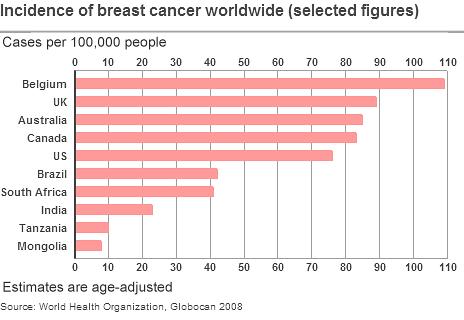Breast cancer: NHS to offer tamoxifen to at-risk women
- Published

Angelina Jolie revealed last month that she had undergone a preventative double mastectomy
Thousands of women across Britain with a family history of breast cancer are to be offered drugs on the NHS to help prevent the disease.
The National Institute for Health and Care Excellence says tamoxifen or raloxifene taken daily for five years can cut breast cancer risk by 40%.
Its guidance for England and Wales means 500,000 women now have a choice other than mastectomy.
The Scottish government says it will offer tamoxifen to women at risk.
One in every five breast cancers has a family link.
Having close relatives - a mother, sister or aunt - with breast cancer increases a woman's chance of getting the disease, as does inheriting certain genes such as BRCA1 and BRCA2.
Hollywood actress Angelina Jolie revealed last month that she had undergone a preventative double mastectomy to cut her own chance of developing breast cancer because she carries one of these risky genes.
Risk reduction
The new guidelines from NICE - which says the decision about the best treatment should be a joint one between the patient and the medical team - are the first in Europe to recommend that healthy women are given drugs to prevent breast cancer. It is likely that Northern Ireland will soon follow suit.
The Scottish government says women with two or more family members who have had breast cancer will be offered the treatment for five years.
It was announced last month that genetic testing would also be offered in Scotland to those with a 10% risk of a faulty gene.
NICE says women in England and Wales who are aged over 35 and at "moderate" or "high" risk of breast cancer as a result of their family history or genes should be considered for preventative drug therapy.
By this they mean women with at least a one in six chance of developing the disease.
Wendy Watson, who has had a preventative double mastectomy, says "it has to be what is right for the individual"
The Welsh government said it welcomed the changes and expected health boards to make the drugs "available to patients who meet the clinical criteria".
Taking a tamoxifen or raloxifene tablet every day for five years could nearly halve breast cancer risk and this protective effect should last for at least a decade, studies suggest.
But experts say women need to carefully weigh up their options.
Surgery to remove both breasts would bring a woman's lifetime risk down to virtually zero.
And tamoxifen can be unpleasant to take, causing side-effects such as hot flushes and blood clots.
Up to half of breast cancer patients prescribed the drug as a treatment for their tumour give up taking it, research suggests.
Wendy Watson chose to have a preventative double mastectomy at the age of 37 because she knew of nine relatives who had breast cancer.
Ms Watson, who runs a helpline for those at high risk of breast cancer, told BBC Breakfast: "For me, personally, I'm more than happy with the decision that I made and I've been able to take control and get on with my life and do lots of things."
But she said "risk-reducing surgery is not for every woman and I think what we need to do is offer these women as many choices as they can".

Breast nurse specialist Susan Heard, a member of the NICE guidelines development group, told BBC Radio 4's Today programme: "Tamoxifen is not an expensive drug - to give a woman five years of tamoxifen would only cost about £130 - it can cost £12,000 to treat a woman for breast cancer in a year.
"Tamoxifen has been used for 40 years in the treatment of breast cancer very successfully to stop it coming back and I think the healthcare professionals are very familiar with the drug and that experience can be passed on to our patients."
Breast cancer is the most common cancer in the UK, with about 50,000 women and 400 men diagnosed with the condition each year.
- Published25 June 2013
- Published18 May 2013
- Published14 May 2013
- Published15 January 2013
- Published20 May 2013
- Published18 April 2012